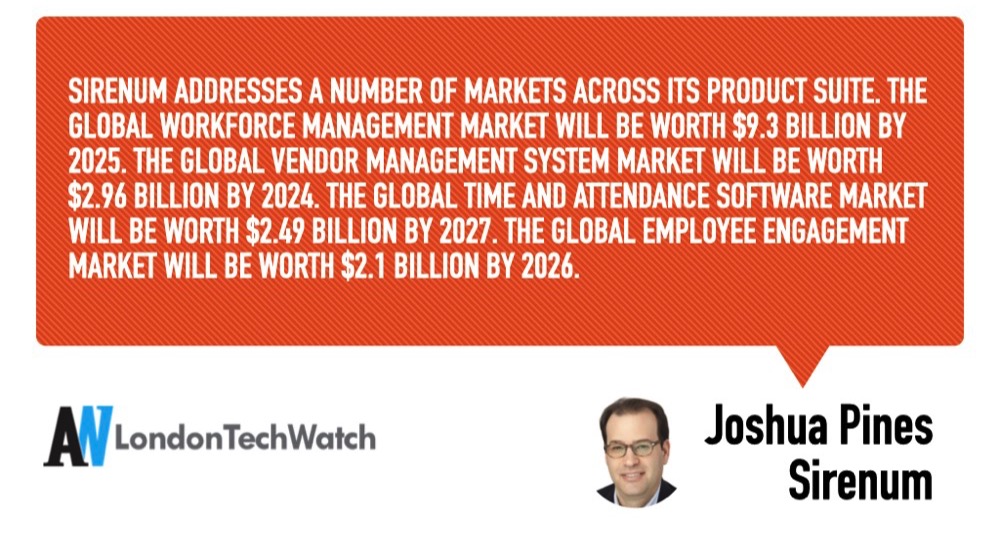The process of managing and organizing shift schedules for workers can be a daunting and time-consuming task for employers. For employees, disorganized shift scheduling creates uncertainty and affects their personal lives in a number of ways including daily activities and sleep. Sirenum is a technology-enabled management solution that allows employees to manage their shift-based workforce from a single centralized platform. The startup handles a variety of tasks including scheduling, payroll, compliance, and reporting. For example, employers can see the number of hours an individual has worked recently to ensure that they are compliant with UK HSE Guidelines to prevent any accidents arising from fatigue, ensuring the safety of the entire workforce. The platform is built on Salesforce and is versatile, allowing companies to manage staff across borders and in specific use cases. In response to COVID, Sirenum was able to adapt to help manage workers at vaccination centres and assist the NHS at the height of the pandemic with a free version of the product.
London TechWatch caught up with Cofounder Joshua Pines to learn more about how the company emerged from a solution built for the 2012 London Olympics, the company’s future plans, and latest round of funding, which brings the total funding raised to $4.1M.
Who were your investors and how much did you raise?
Sirenum raised £2 million Series from the William Currie Group alongside former Tesco CEO Sir Terry Leahy.
Tell us about your product or service.
Sirenum’s cloud-based technology helps employers better manage their shift workers. Its mission is to support any shift worker in any industry in any country. It works with some of the biggest names in staffing including Randstad, Impellam, Manpower, and GI Group, as well as specialist agencies like TES. Sirenum also powers high-complexity work environments like those found at Great Western Railways, Scottish Borders, and National Grid. It simplifies the process of managing shift workers, including rostering and managing schedules, monitoring, and engaging staff, and processing key financial processes including payroll.
 One of the biggest challenges in managing shift workers is ensuring the right person is in the right place at the right time and is paid the right amount. Sirenum helps to streamline this process and empowers staff to manage their own time by accepting or rejecting shifts, start and end shifts, and check their payslips at any time through a mobile app. Built into the Sirenum solution is real-time fatigue and risk management based on the UK HSE guidelines, which also means employers can ensure the health and safety of their employees and adhere to compliance.
One of the biggest challenges in managing shift workers is ensuring the right person is in the right place at the right time and is paid the right amount. Sirenum helps to streamline this process and empowers staff to manage their own time by accepting or rejecting shifts, start and end shifts, and check their payslips at any time through a mobile app. Built into the Sirenum solution is real-time fatigue and risk management based on the UK HSE guidelines, which also means employers can ensure the health and safety of their employees and adhere to compliance.
Sirenum streamlines the process of workforce management and ensures all the tools needed such as shift management, payroll, compliance, and scheduling is all on one platform. This ensures that companies can hire the right amount of people for the job and continually keep an eye on margins and revenue.
What inspired the start of Sirenum?
My Cofounder Benjamin Rubin ran a staffing agency in London and was on honeymoon with his wife when he received a call that one of his employees had been hit by a train. At that time rostering of shift workers was a fragmented process and there was no specific HR software to support such activities as scheduling, time interpretation, or HR record management for shift workers.
Thankfully, the employee was fine, but Benjamin realised that to avoid being in that same situation again, he needed a tool to be able to manage his staff safely at multiple locations. The staffing agency developed the technology that would become Sirenum and in 2012 won the contract to staff the Olympic Stadium, one of the most dynamic workforce environments there could be, based on the reputation of its internal IT systems against some of the leading global agencies. In 2013, Sirenum was founded and by the next year, it began adding clients in multiple industries.
How is it different?
Sirenum has been purpose-built whereas some of its competitors have acquired different companies to add to their tech stack. Sirenum’s platform also offers clients enterprise-class products as a result of being built on the Salesforce platform. As more employers make platform-based decisions, being on the world’s leading B2B platform means Sirenum can provide unrivaled scalability, security, integration, and reporting capabilities. It also benefits from a massive ecosystem of partner products, developers, and implementers.
Sirenum’s product is infinitely configurable, and its time interpretation engine is the most sophisticated in the market, able to service Norway, Belgium, California, and other countries with complex payroll regulations.
What market are you targeting and how big is it?
Sirenum addresses a number of markets across its product suite. The global workforce management market will be worth $9.3 billion by 2025. The global vendor management system market will be worth $2.96 billion by 2024. The global time and attendance software market will be worth $2.49 billion by 2027. The global employee engagement market will be worth $2.1 billion by 2026.
What’s your business model?
Sirenum’s business is based on a subscription model with clients across six continents.
How has COVID-19 impacted your business?
COVID-19 has highlighted the strengths of the Sirenum product suite and our business model. Because of the way we build our products, it can be quickly adapted to new use cases, even industries. Covid-19 has actually created more demand for our services. We played an active role at the height of the pandemic in supporting the NHS with a streamlined version of our product for free and also created a tool that could be used by charity groups needing to organise volunteers. We’ve also developed new templates on the platform for use by staffing agencies managing workers at Covid vaccination centres. From an operational perspective, it’s had a very minimal impact on our business. We have been a very flexible work environment that used video conferencing from day one.
What was the funding process like?
This round featured many repeat investors, from our first angel to our last seed rounds, which was closed in autumn, 2019.
What are the biggest challenges that you faced while raising capital?
The biggest challenge was not being able to meet in person due to the pandemic. We thankfully had already developed a strong relationship with our existing investors so that the trust was there to ensure our virtual meetings were productive.
What factors about your business led your investors to write the cheque?
Sirenum sits at the intersection of many fast-growing large markets being positively impacted by a number of macro-level trends. In addition, we’ve already demonstrated our ability to sell and deliver to some of the largest and most demanding employers in the market–industry leaders like Manpower, Randstad, and Impellam trust Sirenum for their workforce management technology.
What are the milestones you plan to achieve in the next six months?
Obviously continued MRR growth is key in the SaaS industry.
What advice can you offer companies in London that do not have a fresh injection of capital in the bank?
We have long been big believers in Lean operations and will continue to be! We also lean heavily on a model of learning fast. Many startups talk about failing fast but that focuses on only the first part of the process. Failure is only useful if you learn from it.
We have long been big believers in Lean operations and will continue to be! We also lean heavily on a model of learning fast. Many startups talk about failing fast but that focuses on only the first part of the process. Failure is only useful if you learn from it.
Where do you see the company going now over the near term?
From a technology perspective, we are expanding and diversifying our product suite. It’s the next natural step as we move from a single product company to a multi-product suite. From a commercial perspective, we will be deepening our presence in the mid-market and more aggressively penetrating geographies outside the UK and Ireland, especially the Benelux and DACH regions, ANZ, and the US. From a personnel perspective, we will continue to grow both–commercially and technically–and expect to be around 60 people soon.
What is your favourite restaurant in London?
Delicatessen in Hampstead.






